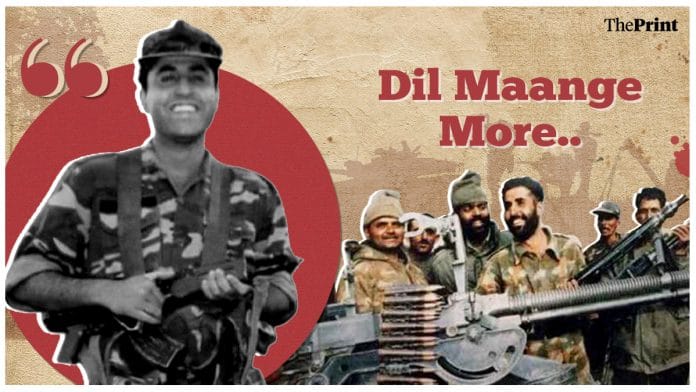New Delhi: Ye Dil Mange More — when this slogan from a Pepsi commercial echoed in Kargil’s mountains, it inspired a few men and changed the course of the conflict between India and Pakistan. It was Captain Vikram Batra who made it a war cry. In Param Vir: Our Heroes in Battle, Ian Cardozo details how Batra marked the successful recapture of Tololing Ridge’s Point 5140 mountain by saying, “Ye Dil Maange More!”.
“One of the Pakistani Army soldiers told me that my codename was ‘Shershaah’ and said ‘Oh Shershaah, you have come, [but] don’t try to come up otherwise you will have a tough time!’ My guys went wild, because how dare a Pakistani troop challenge us,” a jubilant Captain Vikram Batra had told NDTV’s Barkha Dutt at an Army camp in Kargil about his newfound nickname, known on both sides of the border, during the conflict in July 1999.
Days after this interview, Captain Batra was killed in action by Pakistani forces while trying to take a fellow soldier to safety on 7 July and was posthumously awarded the Param Vir Chakra.
23 years on, Captain Batra has been immortalised in military history, for his bravery due to the crucial role he played in India’s eventual victory at Kargil.
Also read: ‘Yeh Dil Maange More’ – The Pepsi slogan now synonymous with Kargil braveheart Vikram Batra
Batra: the karate kid
Born on 9 September 1974, Batra hailed from Palampur, a hill station in Himachal Pradesh’s Kangra Valley. He completed his schooling there, showing proficiency in karate and table tennis, the latter of which he played for his school at the national level alongside his twin brother, Vishal.
Batra then went to Panjab University’s affiliate DAV College in Chandigarh for higher education. Following in his grandfather’s footsteps, he joined the National Cadet Corps’ (NCC) Air Wing.
Batra spent the entirety of his undergraduate years in the NCC’s Air Wing and was on the brink of joining the merchant navy in Hong Kong, having been selected with “his uniform stitched and tickets booked”.
But he made a U-turn for he had a slightly altered career goal in mind and money was no longer the highest priority, according to his father, G.L. Batra. “He was selected for the merchant navy and had almost joined it. But something made him change his mind. He told me he was not after money. He wanted to do something extraordinary that would bring fame to his country,” G.L. Batra told Rediff in 2000.
Vikram Batra, while preparing for the Combined Defence Services Examination (CDSE), simultaneously enrolled for a Master’s in English after completing his undergrad in 1995. He also worked part-time as a branch manager for a travel agency in Chandigarh to support himself.
Upon clearing the CDSE in 1996, he left for Dehradun’s Indian Military Academy, training for 18 months before he was commissioned as a Lieutenant to the 13th battalion of the Jammu and Kashmir Rifles. J&K’s militant-targeted Sopore district was his first posting with the battalion in 1998.
Batra’s first brush with death on duty came during his Sopore posting when a militant’s bullet grazed him but killed a soldier of his platoon right behind him, leading Batra to believe that he was the intended target.
Also read: ‘Soldiers and I are expendable, India’s reputation is not’ – How Sam Manekshaw rose to the top
The final call
The Kargil conflict had begun in May 1999 with Pakistani paramilitary and armed forces infiltrating the Line of Control and taking up key positions in the mountainous district, around the likes of Dras and Mushkoh Valley.
The 13 Jammu and Kashmir Rifles did not get involved in the conflict until their arrival in Dras on 6 June, the day the Indian Army was to embark on a significant counteroffensive to retake territory overrun by Pakistani troops, such as Tololing.
While Batra, then a Lieutenant, and his battalion primarily acted as a reserve force at Dras and Tololing, their responsibilities escalated later in June with the recapture of Tololing Ridge’s Point 5140 mountain.
Although he sustained injuries, Batra’s tenacity and tactical acumen was said to be a deciding factor in India’s successful recapture, as his decision to attack the Pakistani troops “from the rear” led him to kill multiple soldiers in close combat, single-handedly.
The J&K battalion’s subsequent assignment in early July was to recapture the nearby Mushkoh Valley’s Point 4875 from the Pakistanis. The arrival of Batra — ‘Shershaah’ as soldiers on both sides of the border knew him as on radio — was reportedly a major morale boost for the Indian soldiers around the Mushkoh Valley.
However, several days of skirmishes between the Indians and Pakistanis across the harsh terrain ultimately resulted in Batra being killed in action. He was shot in the chest by a sniper and in the head by a rocket-propelled grenade (RPG) splinter while trying to evacuate a fellow injured soldier.
India recaptured the lost territory and regained the LOC status quo on 26 July 1999, nearly three weeks after Batra’s death. But due to his actions during the battalion’s assignments, as well as his signature slogan aired both on Army radio and on NDTV, Batra became the face of the Kargil conflict.
(Edited by Anurag Chaubey)






